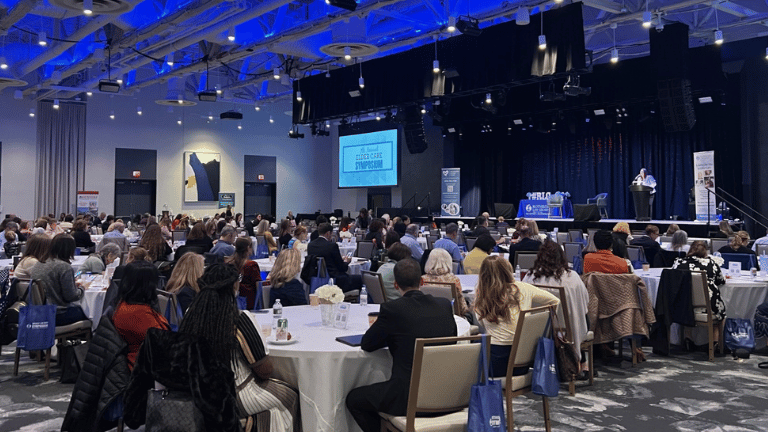The 7th Annual Rothkoff Elder Care Symposium was held on Wednesday, October 16, 2024, at Live Casino Hotel in Philadelphia. Over 250 attendees, along with more than 30 exhibitors and speakers, spent a full day learning and sharing ideas on how to improve the services offered to older adults. We thank all the sponsors, exhibitors, attendees, and speakers for making such a great day possible. We want to share the Symposium’s opening remarks by Jerry Rothkoff with you. A full recap of the Symposium will be forthcoming.
Jerry Rothkoff’s opening Symposium remarks:
“Thank you all for taking the time to attend today’s Symposium. We look forward to the excellent presentations and ideas throughout the day.
Jeanne Louise Calment of France, who died at age 122 in 1997, is believed to be the oldest documented human. She moved to a nursing home in 1985 at age 110. According to Wikipedia, after entering the nursing home, her daily routine consisted of being awoken each morning at 6:45 a.m., and started the day with a long prayer thanking God for being alive and for the beautiful day which was starting. She exercised daily, flexing and stretching her hands, followed by her legs.
She had dessert with every meal and said that, given a choice, she would eat fried and spicy foods instead of the bland foods on the menu. She made herself daily fruit salads with bananas and oranges. She enjoyed chocolate, sometimes indulging in over two pounds of chocolate per week. After each meal, she smoked a cigarette and enjoyed a small glass of port wine. In the afternoon, she would take a nap for two hours in her armchair and then visit her neighbors in the care home, telling them about the latest news she had heard on the radio. At nightfall, she dined quickly, returned to her room, listened to music (as her poor eyesight prevented her from enjoying her crossword puzzles), smoked a final cigarette, and went to bed at 10:00 p.m. On Sundays, she went to Mass, and on Fridays she went to Vespers and regularly prayed to and sought help from God and wondered about the afterlife.
That is not necessarily the recipe for a long life, but it worked for Jeanne Louise Calment. However, living to 122 may not be in the cards for the rest of us. A recent study reported in the journal Nature Aging looked at data on life expectancy at birth collected between 1990 and 2019 from places where people typically live the longest, including Australia, France, Italy, Hong Kong, Sweden, Japan & Switzerland. The study concluded that while average life expectancies increased, the rates at which they rose slowed down.
Researchers concluded the data suggested that after decades of life expectancy marching upward thanks to medical and technological advancements, humans could be closing in on the limits of what is possible for average life span. “As long as we live now is about as long as we are going to live,” said S. Jay Olshansky, a professor who led the study.
If, as the study concludes, we are not able to significantly increase life expectancy, then I believe we should concentrate on making living a bit easier and keeping people safe. The presentations and breakout sessions for today’s Symposium do just that. The theme for today’s Symposium is “Technological Innovations in Aging.” Our keynote speaker is Michael Staff, the Vice President of Healthcare Technology, North America for Vayyar Imaging.
Vayar is a Hebrew word meaning “he saw” or “he sees.” I believe we are here today because of what WE SEE or HAVE SEEN.
We have seen the devasting effects COVID-19 had on the long-term care population.
We see the inadequate care our frail seniors are receiving in nursing homes.
We see what little government benefits are available to pay for home care expenses.
We see caregivers struggling to take care of their parents while managing their own families.
We see the healthcare inequality that exists in this country.
However, we also see the innovations taking place in health care & long-term care.
We see the different improved models of care existing in long-term care after COVID-19.
We see the trial programs currently in effect through CMS for greater Medicare funding of home care & care navigation.
We see so many wonderful, dedicated caregivers, lay and professional, that exist in this country.
And most importantly, for today, we see all of you, both in person and virtually. Investing a full day of learning and sharing innovative ideas. Thank you for all you do.
Thank you to all the sponsors, exhibitors, and attendees for making the Symposium possible. I want to thank our entire Rothkoff Law team for their hard work and commitment. I especially want to thank our marketing and outreach team—Laura Nelson, Donna Daciuk and her husband Steve, Jennifer Riggs, and Alida Rowe—for doing such a fantastic job. We will be celebrating the 25th anniversary of Rothkoff Law Group in February 2025. I thank my partner, Bryan Adler & our team, along with my family, for joining me on this 25-year journey, which still has more exploration to be done and more destinations to visit. To Stephanie Fisch and Jacinda Graham, if you are watching virtually, we look forward to having you back as valuable members of the Rothkoff team.”


